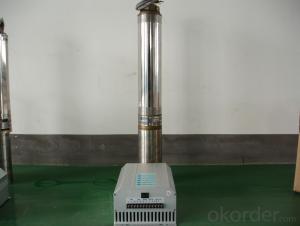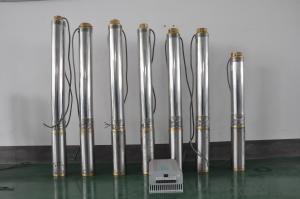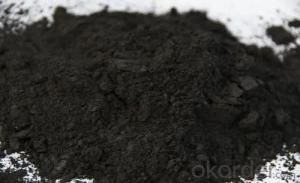Solar Water Pump (110V)
- Loading Port:
- China Main Port
- Payment Terms:
- TT OR LC
- Min Order Qty:
- -
- Supply Capability:
- -
OKorder Service Pledge
OKorder Financial Service
You Might Also Like
Item Description :
This superb new addition to our solar fountain range comes with a 10w solar panel,and a powerful fountain pump that is capable of producing fountains of up to 2m in height. As well as being easy to set up and use.Instruction manual is supplied for assembly and maintenance.
Solar Fountain Key Features :
Powered by direct sunlight
No high voltage electric mains required
Safe for children
Max. height of fountain: 2M
Max. flow capacity: 800 L/H(176 GAL)
10W Polycrystalline solar panel included
18V DC brushless pump
Solar Pump Features :
Can produce fountains up to : 2M (tube height) 1.4M (fountain height)
Comes with multiple nozzle accessories
Cable Length : 5M
Solar Panel Features :
10W peak power.
Polycrystalline highly efficient solar panel
Comes mounted in aluminium frame
Comes with ground stake and rotating knob so you can angle your panel toward the sun
What You Will Get :
10W solar panel
Solar pump
Ground Sake
Nozzle accessories
Precautions :
DO NOT alter or change the product itself or its components
Operate pump in freshwater only, never above 50 degrees celsius
Keep away from flammable liquids
Do not connect to any other power supply other than the included
- Q:Can a solar pump be used for water supply in farms or agricultural fields?
- Indeed, one can utilize a solar pump to facilitate water supply in farms or agricultural fields. Solar pumps present a cost-efficient and eco-friendly solution for nourishing crops and livestock. By harnessing solar energy to drive the pump, the reliance on electricity or fuel becomes obsolete. These pumps cater to a range of agricultural needs, including irrigation, livestock hydration, and general water distribution. Particularly in remote zones where grid electricity is either unavailable or exorbitantly priced, solar pumps prove to be a valuable asset. They demand minimal maintenance, boast reliability, and boast a lengthy lifespan, rendering them ideal for uninterrupted use in agricultural environments. Furthermore, solar pumps actively aid in diminishing carbon emissions and the dependence on fossil fuels, consequently contributing to a more sustainable and environmentally conscious agricultural sector.
- Q:Can a solar pump be used for water supply in remote islands or coastal areas?
- Yes, a solar pump can certainly be used for water supply in remote islands or coastal areas. Solar pumps are highly suitable for such locations as they rely on solar energy to power the pump, eliminating the need for grid electricity or fuel. With the abundance of sunlight in coastal areas and islands, solar pumps can efficiently extract water from various sources such as wells, rivers, or the sea. They provide a sustainable and reliable solution for water supply, promoting self-sufficiency and reducing dependence on traditional energy sources.
- Q:Can a solar pump be used for water supply in hospitals or healthcare facilities?
- Yes, a solar pump can be used for water supply in hospitals or healthcare facilities. Solar pumps are reliable and cost-effective solutions that can provide a sustainable and consistent water supply, which is crucial for ensuring proper hygiene and sanitation in healthcare settings. Additionally, solar pumps can operate independently of the electrical grid, making them suitable for areas with limited or unreliable electricity access.
- Q:Can a solar pump be used for water desalination?
- Indeed, water desalination can make use of a solar pump. By harnessing solar energy, these pumps are capable of converting sunlight into electrical energy, enabling them to function. Water desalination is the procedure wherein salt and other impurities are eliminated from seawater or brackish water, making it suitable for drinking or irrigation. Solar pumps can efficiently draw water from its source, such as the ocean, and direct it towards a desalination system. Solar pumps bring numerous benefits to water desalination. Firstly, they are environmentally friendly since they don't generate greenhouse gas emissions or rely on fossil fuels. As a result, they serve as a sustainable solution, particularly in regions with ample sunlight. Additionally, solar pumps prove to be cost-effective in the long run as they don't require fuel or electricity expenses once installed. Nevertheless, it is crucial to acknowledge that a solar pump alone cannot desalinate water. Its main function is solely to pump water into a desalination system. The desalination process usually involves either reverse osmosis or distillation, both of which demand energy to operate. Solar pumps can be seamlessly integrated into these desalination systems, allowing the solar energy generated by the pump to power the entire desalination process, thus establishing a self-sufficient and sustainable system. All in all, a solar pump can unquestionably be employed for water desalination, but it must be integrated with a desalination system that utilizes solar energy for the actual purification process. By combining these elements, a reliable and sustainable solution for producing clean and drinkable water from seawater or brackish water sources can be achieved.
- Q:Can a solar pump be used for water aeration in ponds and lakes?
- Yes, a solar pump can be used for water aeration in ponds and lakes. Solar pumps are designed to operate using solar energy, which makes them a sustainable and cost-effective option for water aeration. They can be used to circulate and oxygenate the water, improving its quality and promoting the growth of aquatic life.
- Q:Are solar pumps suitable for use in botanical research centers?
- Yes, solar pumps are suitable for use in botanical research centers. They provide a sustainable and environmentally friendly solution for water supply, allowing for efficient irrigation and nurturing of plants. Additionally, solar pumps can be easily installed and are cost-effective in the long run, making them a viable option for botanical research centers that prioritize energy efficiency and conservation.
- Q:How do I ensure the longevity of the solar panels used in a solar pump system?
- To ensure the longevity of the solar panels used in a solar pump system, it is important to follow a few key practices. Firstly, regular maintenance is crucial, including cleaning the panels to remove any dirt or debris that may accumulate. Additionally, inspecting the panels for any signs of damage or wear and tear is important, and addressing any issues promptly can help prevent further damage. It is also essential to ensure that the panels are installed in an optimal location where they receive maximum sunlight exposure and are not obstructed by shading. Lastly, protecting the panels from extreme weather conditions such as hail or heavy snowfall can also help prolong their lifespan.
- Q:Can a solar pump be used for municipal water supply?
- Indeed, a solar pump is capable of being utilized for the provision of municipal water. These pumps have been engineered to convert solar energy into mechanical energy, effectively enabling the extraction of water from either a well or another water source, subsequently distributing it to communities or municipalities. The customization of solar pumping systems allows for the fulfillment of specific requirements pertaining to municipal water supply, including the desired volume of water, the distance over which the water must be transported, and the disparity in elevation between the water source and the community. The implementation of solar pumps in municipal water supply yields numerous advantages, encompassing reduced operating costs, diminished reliance on fossil fuels, and a solution that is both sustainable and environmentally friendly. Moreover, the integration of storage systems with solar pumps ensures a consistent water supply, even during periods of limited sunlight or during nighttime. In summary, solar pumps present a dependable and efficient alternative for municipal water supply, particularly in regions that enjoy ample sunlight.
- Q:Can a solar pump be used in areas with high levels of bacteria or contamination in water?
- Yes, a solar pump can be used in areas with high levels of bacteria or contamination in water. However, it is important to note that a solar pump alone may not eliminate bacteria or contamination from the water. To ensure safe and clean water, additional water treatment methods such as filtration or disinfection should be implemented in conjunction with the solar pump.
- Q:How does a solar pump help in promoting sustainable development?
- A solar pump helps in promoting sustainable development by providing a reliable and clean source of energy for water pumping. It reduces the dependence on fossil fuels and minimizes greenhouse gas emissions, contributing to environmental conservation. Additionally, solar pumps can improve access to reliable water supply in remote areas, enhancing agricultural productivity, economic growth, and social well-being, especially in developing regions.
1. Manufacturer Overview |
|
|---|---|
| Location | |
| Year Established | |
| Annual Output Value | |
| Main Markets | |
| Company Certifications | |
2. Manufacturer Certificates |
|
|---|---|
| a) Certification Name | |
| Range | |
| Reference | |
| Validity Period | |
3. Manufacturer Capability |
|
|---|---|
| a)Trade Capacity | |
| Nearest Port | |
| Export Percentage | |
| No.of Employees in Trade Department | |
| Language Spoken: | |
| b)Factory Information | |
| Factory Size: | |
| No. of Production Lines | |
| Contract Manufacturing | |
| Product Price Range | |
Send your message to us
Solar Water Pump (110V)
- Loading Port:
- China Main Port
- Payment Terms:
- TT OR LC
- Min Order Qty:
- -
- Supply Capability:
- -
OKorder Service Pledge
OKorder Financial Service
Similar products
New products
Hot products
Hot Searches
Related keywords




























